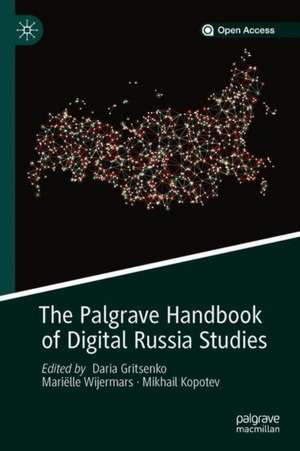The Palgrave Handbook of Digital Russia Studies
Editat de Daria Gritsenko, Mariëlle Wijermars, Mikhail Kopoteven Limba Engleză Hardback – 15 dec 2020
Preț: 405.64 lei
Nou
Puncte Express: 608
Preț estimativ în valută:
77.62€ • 81.25$ • 64.60£
77.62€ • 81.25$ • 64.60£
Carte disponibilă
Livrare economică 10-24 martie
Livrare express 21-27 februarie pentru 62.06 lei
Preluare comenzi: 021 569.72.76
Specificații
ISBN-13: 9783030428549
ISBN-10: 3030428540
Pagini: 596
Ilustrații: XXIV, 612 p. 38 illus.
Dimensiuni: 155 x 235 x 45 mm
Greutate: 1.07 kg
Ediția:1st ed. 2021
Editura: Springer International Publishing
Colecția Palgrave Macmillan
Locul publicării:Cham, Switzerland
ISBN-10: 3030428540
Pagini: 596
Ilustrații: XXIV, 612 p. 38 illus.
Dimensiuni: 155 x 235 x 45 mm
Greutate: 1.07 kg
Ediția:1st ed. 2021
Editura: Springer International Publishing
Colecția Palgrave Macmillan
Locul publicării:Cham, Switzerland
Cuprins
1. Digital Russia Studies: An Introduction.
2. The digitalization of Russian politics and political participation.
3. E-Government in Russia: Plans, Reality, and Future Outlook.
4. Russia’s Digital Economy Program: An Effective Strategy for Digital Transformation?.
5. Law and Digitization in Russia.
6. Personal Data Protection in Russia.
7. Cyber-Crime and Punishment: Security, Information War, and the future of RuNet.
8. Digital activism in Russia: The evolution and forms of online participation in an authoritarian state.
9. Digital Journalism: Toward a theory of journalistic practice in the twenty-first century.
10. Digitalization of Russian education: Changing actors and spaces of governance.
11. Shifting the norm: the case of academic plagiarism.
12. Digitalization of religion in Russia: adjusting preaching to new formats, channels and platforms.
13. Doing Gender Online: Digital Spaces for Identity Politics.
14. Digitalization of consumption in Russia: Online platforms, regulations and consumer behavior.
15. Digital Art: A sourcebook of ideas for conceptualising new practices, networks and modes of self-expression.
16. From Samizdat to New Sincerity. Digital Literature on the Russian-language Internet.
17. Run Runet Runaway: The Transformation of the Russian Internet as a Cultural-Historical Object.
18. Corpora in text-based Russian studies.
19. RuThes Thesaurus for Natural Language Processing.
20. Social media based research of interpersonal and group communication in Russia.
21. Digitizing Archives in Russia: Epistemic Sovereignty and Its Challenges in the Digital Age.
22. Affordances of Digital Archives: A Case of Prozhito archive of personal diaries.
23. Open Government Data in Russia.
24. Topic modeling in Russia: current approaches and issues in methodology.
25. Topic Modeling Russian History.
26. Studying ideational change in Russian politics with topic models and word embeddings.
27. Deep Learning for the Russian Language.
28. Automatic Sentiment Analysis of Texts: Case of Russian.
29. Social Network Analysis in Russian Literary Studies.
30. Tweeting Russian politics: studying on-line political dynamics.
31. The State of the Art: Surveying Digital Russian Art History.
32. Geospatial data analysis in Russia’s geoweb.
Notă biografică
Daria Gritsenko is Assistant Professor at the University of Helsinki, Finland, affiliated with the Aleksanteri Institute and the Helsinki Center for Digital Humanities (HELDIG). She is Co-Founder of Digital Russia Studies, an interdisciplinary network of scholars working at the intersection of ‘digital’ and ‘social’ in Russia and beyond.
Mariëlle Wijermars is Assistant Professor in Cyber-Security and Politics at Maastricht University, Netherlands. She is Co-Founder of Digital Russia Studies and Editor of the journal Studies in Russian, Eurasian and Central European New Media. She co-edited Freedom of Expression in Russia’s New Mediasphere (2020).
Mikhail Kopotev is Academic Supervisor of the MA program in Language Technology at HSE University, Russia, and Associate Professor at the University of Helsinki, Finland. His research interests include Corpus Linguistics, quantitative analysis of big textual data, plagiarism detection, and computer-assisted language learning. He is the author of Introduction to Corpus Linguistics (2014) and a co-editor of Quantitative Approaches to the Russian Language (2018).
Mariëlle Wijermars is Assistant Professor in Cyber-Security and Politics at Maastricht University, Netherlands. She is Co-Founder of Digital Russia Studies and Editor of the journal Studies in Russian, Eurasian and Central European New Media. She co-edited Freedom of Expression in Russia’s New Mediasphere (2020).
Mikhail Kopotev is Academic Supervisor of the MA program in Language Technology at HSE University, Russia, and Associate Professor at the University of Helsinki, Finland. His research interests include Corpus Linguistics, quantitative analysis of big textual data, plagiarism detection, and computer-assisted language learning. He is the author of Introduction to Corpus Linguistics (2014) and a co-editor of Quantitative Approaches to the Russian Language (2018).
Textul de pe ultima copertă
This open access handbook presents a multidisciplinary and multifaceted perspective on how the ‘digital’ is simultaneously changing Russia and the research methods scholars use to study Russia. It provides a critical update on how Russian society, politics, economy, and culture are reconfigured in the context of ubiquitous connectivity and accounts for the political and societal responses to digitalization. In addition, it answers practical and methodological questions in handling Russian data and a wide array of digital methods. The volume makes a timely intervention in our understanding of the changing field of Russian Studies and is an essential guide for scholars, advanced undergraduate and graduate students studying Russia today.
Caracteristici
Explores how Russia has been reconfigured in an era of ubiquitous connectivity
Answers practical and methodological questions concerning how to handle Russian data
Provides a useful guide to students and scholars interested in digitalization and digital research methods
Answers practical and methodological questions concerning how to handle Russian data
Provides a useful guide to students and scholars interested in digitalization and digital research methods
